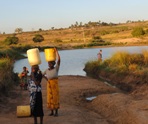
The View from Kenya on World Water Monitoring Day
- By Marianne de Nazareth
- Apr 08, 2010
As our car bumped along the long road to Mariakani village in rural Mombasa, I saw Kenyan mothers carrying their babies strapped to their backs, often balancing a heavy plastic container of water on their heads.
For several years, Mombasa has been reeling under terrible drought conditions. Procurement of fresh water by the rural women was from dodgy sources and this caused a lot of illness and death by diarrhea in children and babies. I and others on this field visit witnessed women and girls collecting water from a local village pond for their fresh water supplies. They walked hours to haul enough water for their families.
This local problem has not been lost on the rest of the world. Achim Steiner, executive director of the United Nations Environment Programme (UNEP), spoke to the issue last month in Nairobi, Kenya. “It is what we have done to the water supplies of the world which is coming back to haunt us. Transforming wastewater from a major health and environmental hazard into a clean, safe and economically attractive resource is emerging as a key challenge in the 21st century. It is a challenge which will intensify as the world undergoes rapid urbanization, industrialization, unless decisive action is taken.
"The new report … Sick Water says 2 million tons of waste estimated to equal 2 or more billion tons of wastewater is being discharged daily into rivers and seas. 1.2 million children die of this, and more than half the hospital beds have people suffering and dying from the drinking of polluted water than [from] all the violence in the world,” he added.
Steiner's words need to be heeded ─ especially in places where people take fresh water supplies for granted. After all, water that is fit to drink without risk of immediate or long-term harm is fundamental to human well being. Without food we can survive for weeks, but without water we can die of dehydration in as little as two days.
At Mariakani, we witnessed the International Water Association’s Water Quality Monitoring program in action. Meant to educate the village on the importance of quality water for household uses, we saw children in the Kinagoni Primary School test the turbidity and pH of the water using reliable field sampling tools. Facilitators taught the children that daily monitoring and preventing pollution in their fresh water source was important for all-round health.
According to UNEP and the Pacific Institute, “new and improved legal and institutional frameworks to protect water quality are needed from the international level down to the watershed and community level. As a first step, laws on protecting and improving water quality should be adopted and adequately enforced. Model pollution policies should be disseminated more widely and guidelines should be developed for ecosystem water quality as they are for drinking water quality. A concerted global education and awareness building campaign around water quality issues is needed, with targeted regional and national campaigns that connect water quality to issues of cultural and historical importance.”
Nancy Ross, director of Communications at the Pacific Institute in California, who also went on the field visit, said, “Education and information are key to motivating for change – and for making change. Giving the girls a hands-on experience to understand what can be going on with their water at the very least gives them something to think about, and certainly can lead to their being more aware of water quality so that they do whatever is available to them to try to use water in the cleanest, safest way that is possible. Any steps toward using cleaner water lead to health benefits for themselves and their families, and the empowerment of knowing, and doing, can also be great.”
There are few areas on the planet that do not face serious water availability or management problems like the village of Mariakani. But although water is a global issue, the problems and solutions are highly localized.
About the Author
Marianne de Nazareth, a Fellow with the United Nations Framework Convention on Climate Change and UNEP, lives in Bangalore, India. She traveled to Mariakani during celebrations for World Water Monitoring Day in March 2010.